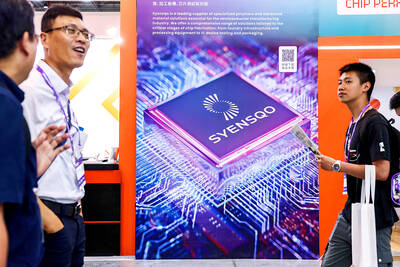A pair of US senators on Thursday introduced bipartisan legislation that would require US President Donald Trump to more systematically punish China for stealing US technology.
The bill requires the president to give Congress periodic updates on foreign companies and individuals that steal vital US trade secrets and mandates the leveling of penalties, including economic sanctions.
US senators Chris Van Hollen, a Democrat, and Ben Sasse, a Republican, introduced the legislation.
Van Hollen said the bill was a “direct approach” to combating China’s use of illicit methods for acquiring rapid technological advances.
“I think there is a big deterrent benefit to making it clear upfront that when we find this kind of theft, there will be penalties,” Van Hollen said.
The Chinese government has repeatedly insisted that Washington has exaggerated the problem of intellectual property theft for political reasons, dismissing the industrial espionage allegations as groundless.
Van Hollen and Sasse’s bill would require the president to send a report to congressional committees every six months.
The biannual report to Congress must list individuals or companies involved in serial theft of US trade secrets that threatens US national security or economic health.
The legislation also requires the president to impose penalties on those companies, including “blocking sanctions” that generally freeze US assets and bar doing business with a US business or person.
The US has long asserted that China fails to protect US intellectual property and steals it or forces the transfer of it.
Trump has retaliated against Chinese intellectual property and trade practices by hiking tariffs and imposing limits on companies like Huawei Technologies Co (華為).
A US Senate report released in November showed that federal agencies responded too slowly as Beijing recruited US-based researchers to transfer intellectual property from US laboratories, leaving US taxpayers unwittingly funding China’s economic rise.

SEMICONDUCTOR SERVICES: A company executive said that Taiwanese firms must think about how to participate in global supply chains and lift their competitiveness Taiwan Semiconductor Manufacturing Co (TSMC, 台積電) yesterday said it expects to launch its first multifunctional service center in Pingtung County in the middle of 2027, in a bid to foster a resilient high-tech facility construction ecosystem. TSMC broached the idea of creating a center two or three years ago when it started building new manufacturing capacity in the US and Japan, the company said. The center, dubbed an “ecosystem park,” would assist local manufacturing facility construction partners to upgrade their capabilities and secure more deals from other global chipmakers such as Intel Corp, Micron Technology Inc and Infineon Technologies AG, TSMC said. It

EXPORT GROWTH: The AI boom has shortened chip cycles to just one year, putting pressure on chipmakers to accelerate development and expand packaging capacity Developing a localized supply chain for advanced packaging equipment is critical for keeping pace with customers’ increasingly shrinking time-to-market cycles for new artificial intelligence (AI) chips, Taiwan Semiconductor Manufacturing Co (TSMC, 台積電) said yesterday. Spurred on by the AI revolution, customers are accelerating product upgrades to nearly every year, compared with the two to three-year development cadence in the past, TSMC vice president of advanced packaging technology and service Jun He (何軍) said at a 3D IC Global Summit organized by SEMI in Taipei. These shortened cycles put heavy pressure on chipmakers, as the entire process — from chip design to mass

Germany is to establish its first-ever national pavilion at Semicon Taiwan, which starts tomorrow in Taipei, as the country looks to raise its profile and deepen semiconductor ties with Taiwan as global chip demand accelerates. Martin Mayer, a semiconductor investment expert at Germany Trade & Invest (GTAI), Germany’s international economic promotion agency, said before leaving for Taiwan that the nation is a crucial partner in developing Germany’s semiconductor ecosystem. Germany’s debut at the international semiconductor exhibition in Taipei aims to “show presence” and signal its commitment to semiconductors, while building trust with Taiwanese companies, government and industry associations, he said. “The best outcome

People walk past advertising for a Syensqo chip at the Semicon Taiwan exhibition in Taipei yesterday.